Specters of Marx
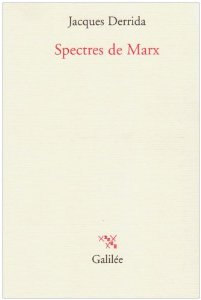
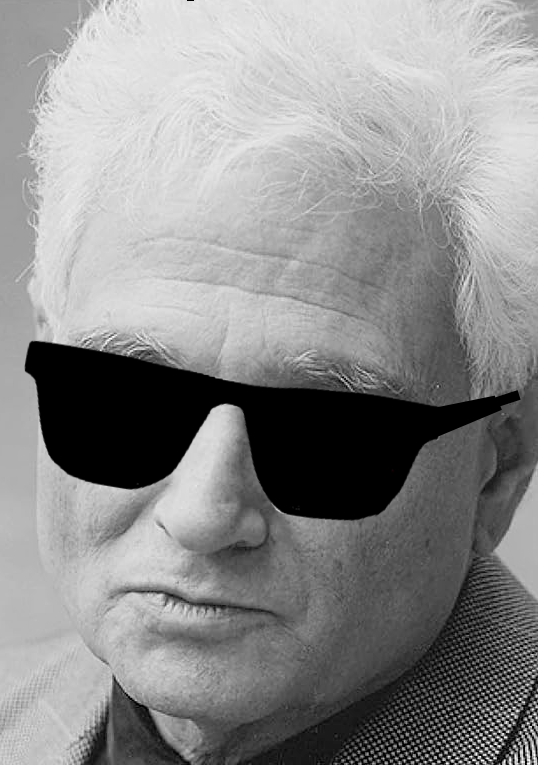

Specters of Marx



憑在論(ひょうざいろん:ハウントロ ジー:hauntology, L'hantologie)あるいは憑在 学(ひょうざいがく)とは、ジャッ ク・デリダの『マルクスの亡霊』(原著, 1993/2007a:37)に登場する用語で、「存在でもないが、かといって不在でもない、死んでいるのでもないが、かといって生きているでも ない」ような亡霊の姿をとってあらわれる、延期されたオリジナル(res extensa)ではないものよっ て表現される、置き換えられた、時間的・歴史的・存在論的脱節(temporal, historical, and ontological disjunction)の状態のことをさす。我々が常態的であると信じ込んでいる、オリジナルとアイデンティティ(同一性)、オリジナルものの存在的な ゆるぎのなさ(→存在論)、を解体するデリダ流の脱構築の方法のレパートリーとしてみることができる(→「憑在論」)。
この書は、マルクスの幽霊とその影響、革 命、記憶、そして現代の政治的状況について論じている。この書物はジャッ ク・デリダの1993年4月22-23日のカリフォルニア大学(リバーサイド校)での講演を基にしている。ではマルク スの幽霊とは何か?マルクスの幽霊とは、共産主義の象徴であり、歴史的な影響を持つものである。幽霊あるいは亡霊に苛まれることで、人間にとっての歴史的 暴力と責任の無限性について考察している。亡霊に苛まれる人間としてのシェイクスピアの主人公ハムレットに焦点があてられる。亡霊を通して、人々は、学び と生きることを学ぶ。デリダは「生きることを学ぶ」というテーマが提起され、死との関係が強調されている。通常は人間はデフォルトで生きているために「生 きることを学ぶ」というのは当たり前でわざわざ言うべきものではないはないし、人々は生きているだけで、生きることをわざわざ学ばない。デリダがいう学び は、生きることにともなう学びのようである。亡霊を媒介にすることで、デリダが主張するのは、生と死の間での倫理的な学びが必要とされるである。また(冷 戦構造の終結により)忘れ去られつつあるマルクスが生前に提起した政治と経済についての考察に、デリダは我々を誘う。そこでは、現代の資本主義とその影響 が分析され、特に新しい国際的な状況が強調されている。マルクス以降、現行の最大の問題とは、経済的な不平等と社会的な排除が問題である。デリダは、それ を霊的な次元での関わりという観点から分析する。すなわち霊的な存在や亡霊の概念が、社会的な関係や経済的な現象と結びつけられているのだ。亡霊は、過去 の記憶や歴史的な影響を象徴する。過去の存在の亡霊が、未来へと投企されている。亡霊を通して未来への展望がはじめて開かれるのである。デリダは、マルク スの思想が現代においても重要であり、未来の社会における役割が探求されていると主張する。新しい国際的な連帯の必要性が強調され、過去の教訓すなわち 「亡霊の記憶」が私たちと亡霊の未来に生かされるべきなのである。
★テーゼ:マルクスは終わっていない
★テーゼ:マルクスを読み直すことは責任 である
★テーゼ:他者としての亡霊に対して応答責任をとる
★テーゼ:死者を排除して生者だけを相手にすることに抗する
★マルクスの亡霊:Specters of Marx
か つての、マルクス主義〈対〉新自由主義の対立構図が崩壊した「今」。マルクスを亡霊としてふたたび(?)召喚しないとならない。マルクスの実在論的存在論(realistic ontology)には、亡霊からの逃避の姿勢がみられる。そして、それらは、抽象的理念と現実態の中間(neither one thing nor the other)に位置する。
あ
らたな正義概念:構造的メシアニズム、宗教なきメシアニズム、メシアニズムなきメシア的な
もの。
★マルクスの亡霊たち : 負債状況=国家、喪の作業、新しいインターナショナル / ジャック・デリダ [著] ; 増田一夫訳・解説,藤原書店 , 2007/ Spectres de Marx : l'État de la dette, le travail du deuil et la nouvelle Internationale / Jacques Derrida , Paris : Galilée , c1993. - (Collection La philosophie en effet)
目次
0.導入
1.マルクスの厳命
2.共謀する=厄祓いする——マルクス主 義(を)
3.摩耗(年齢、時代なき世界の描写)
4.革命の名のもとに、二重のバリケード (不純な「不純なる不純な幽霊たちの物語」)
5.現れざるものの出現——現象学 的「手品」| 0.導入 |
・無限の責任が生じ、いかなる潔白意識の形態
においても安息は禁じられ
ている(6)——導入の前の献辞の部分 ・私は生きることを学びたい=教えたい、終に、と。(10)——デリダ『法の力』Force de loi : le 《fondement mystique de l'autorité》 ・生きることを学べない(教えることも自分自身にという目的語を持てば難しい)——それは[生きるということの]倫理そのものだ(11) ・幽霊にとって「私は生きることを学びたい=教えたい、終に」には可能になるかもしれない(12) ・正義の名において、幽霊にはそれを語れるか?(13) ・そのような問い——「私は生きることを学びたい=教えたい、終に」——、は未来において到来する(15)。 ・ハムレット登場(16) |
・クリス・ハニ(Chris Hani)への追悼 ・倫理学 ・エンゲージメント(16) |
| 1.マルクスの厳命 |
・ひとつならずの亡霊(22)——なぜ亡霊は複数なのか?(→ゾンビの
人類学) ・ヨーロッパのドラマトゥルギー(24)——日付をもたない存在(憑き物) ・マルクスの退場(25) ・シェイクスピアがマルクスをうみ、マルクスがヴァレリーを生んだ(25) ・マルクスの退場(25) ・『精神の政治学』(26) ・カントの頭蓋骨(→精神は骨である) ・モノの存在論(27) →亡霊と精神を区別することをやめるやいなや、精神は身体を備えた亡霊という形で受肉する ・バイザー効果と錯時性(29)——甲冑のせいで本人確認ができない 状態 ・交換価値(30) ・モノとしての王(32) ・潜勢力(ピュイサンス puissance - potenticality)→「可能態と現実態」 ・(1)喪、(2)言語、(3)労働(34-35) (1)喪:喪の作業が必要 (2)言語:刻印するか名の代わりをさすもの 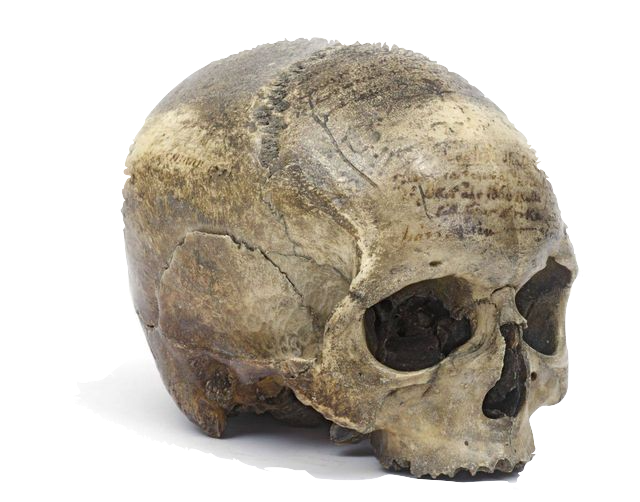 (3)労働(34-35) ・精神の精神としての労働(モノは働く) ・憑在の論理(37) ・マルクス主義はどこへゆく(36) →幽霊とはなんであるか? →亡霊の現前とはなにか? →憑在論(ハウントロジー)の登場(37)——歴史の終焉のために演出される(37) ・幽霊とはなんであるのか? ・亡霊の現実性(エフェクティビテ) ・歴史物語の終焉に、精霊(エスプリ)は再来するかたちでやってくる(37) ・その霊は死者をまとうと同時に予期された過去が戻る(回帰する)37-38. ・マルクスと「アテネのタイモン」 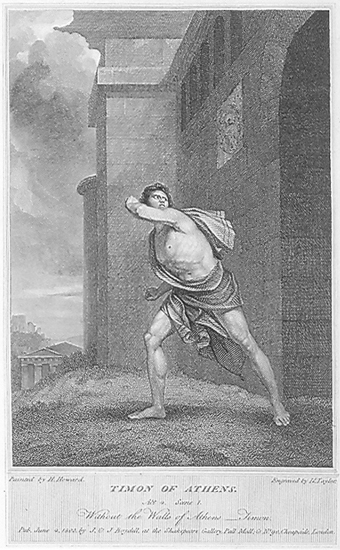 第4幕第1番から、社会を見捨てたタイモン(Isaac Taylor作の版画、1803年) ・シーザーの亡霊 ・スカラー(学者)と亡霊(39) →スカラーは亡霊を信じない ・マーセラス・コンプレックス(40) ・マルクスなくして未来なし(42)——議論しないことは過失になる (43) ・古くからある問いの反復(44)——デジャブ(45) ・1950年代の終末論(46)→フクヤマの歴史の終焉 ・ブランショ「マルクスの3つの言葉」(49) ・遺産の非均質性(49) ・時間は関節を外れている(the time is ou of joint)の翻訳論(52) →時間現象の異常性(56) →法が復讐から由来するとしても、終に正義が復讐という宿命から逃れる日が来るだろ うか?(60) ・正義と錯時性(61)錯時性=アナクロニック(あるいは時間の脱臼) ・アナクシマンドロスの箴言(63):「存在する諸事物の元のもの(アルケー)は、 無限なるもの(ト・アペイロン)である。・・・・・・存在する諸事物にとってそれから生成がなされる源、その当のものへと、消滅もまた必然に従ってなされ る。なぜなら、それらの諸事物は、交互に時の定めに従って、不正に対する罰を受け、償いをするからである。」(→アナクシマンドロス断片) ・破壊不可能な正義、砂漠的なメシアニズム(71)(→メシア的時間、時間の脱臼概念) ・マルクスが開き、隠した問い(76) ・マルクスの厳命(79) ・マルクスの脱政治化(80) ・切迫としての革命的言語(83) ・科学主義イデオロギーに対する警戒(84) ・例としてのマルクス(86) ・マルクスの多様なる言語(88) ・「哲学の終焉」(89) ・終末論と目的論(91) ・共産主義の亡霊——1984年と今日(93) ・亡霊の時間性、亡霊性の効果(97)——亡霊はアナクロニズム ・conjunction の意味論(99) ・貨幣と誓約破棄(103) ・貨幣の幽霊性(109) ・マルクスと幽霊(113) ・行為遂行的発言としての悪魔払い(114) ※マルクスは終わっていない!!(→生ける死者としてのマルクス) |
・ポール・ヴァレリー「ヨーロッパの文明も死をまぬがれることができな
い」 ・「亡霊と精神を区別することをやめるやいなや、精神は身体を備えた亡霊という形で受肉する」(27)(→知覚の現象学) ・「ハムレット」 ハムレット(梗概) (1)王が急死する。王の弟クローディアスは王妃と結婚し、後継者としてデンマーク王の座に就く。 (2)「父王の死」と「母の早い再婚」とで憂いに沈む王子ハムレットは、従臣から「亡き王の亡霊が夜な夜なエルシノアの城壁に現れる」という 話を聞き、自らも確かめる。父の亡霊に会ったハムレットは、実は父の死は「クローディアスによる毒殺」だったと告げられる。 (3)復讐を誓ったハムレットは狂気を装う。王と王妃はその変貌ぶりに憂慮するが、宰相ポローニアスは、その原因を「娘オフィーリアへの実ら ぬ恋」ゆえだと察する。父の命令で探りを入れるオフィーリアを、ハムレットは無下に扱う。 (4)やがて、「王が父を暗殺した」という確かな証拠を掴んだハムレットだが、母である王妃と会話しているところを隠れて盗み聞きしていた宰 相ポローニアスを、王と誤って刺殺してしまう。 (5)さらに、宰相ポローニアスの娘オフィーリアは度重なる悲しみのあまり狂い、やがて溺死する。宰相ポローニアスの息子レアティーズは、父 と妹の仇をとろうと怒りを募らす。 (6)ハムレットの存在に危険を感じた王クローディアスは、復讐心を持ったレアティーズと結託し、毒剣と毒入りの酒を用意して、ハムレットを 剣術試合に招 き、秘かに殺そうとする。しかし試合のさなか、王妃が毒入りとは知らずに酒を飲んで死に、ハムレットとレアティーズ両者とも試合中に毒剣で傷を負ってしま う。 (7)死にゆくレアティーズから真相を聞かされたハムレットは、王を殺して復讐を果たした後、事の顛末を語り伝えてくれるよう親友ホレイショーに言い残 し、この世を去ってゆく。 https://x.gd/U7T2Q ・喪の作業→(34)「「喪の作業」とは、フロイトの精神分析理論における概念で、大切な人を 失った後の心のプロセスを指す。具体的には、喪失対象との結びつきから徐々に離脱していく過程のことである。」 ・マルクス主義はどこにゆく?!(36) ・歴史の終わりに精神=霊は、再来する(→ベンヤミン「歴 史哲学テーゼ」IX) 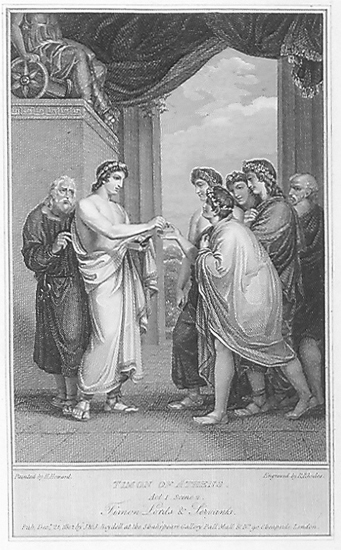 ・アテネのタイモン(38): (1)タイモンの催す盛大な宴に多くの人々が集まってくる。タイモンが太っ腹な性格で、誰にでも物をくれるのが客たちの目当てだった。皆が皆タイモンを褒 めちぎるが、哲学者のアペマンタスだけがタイモンをくそみそにけなす。ヴェンティディアスが負債で有罪になると聞くと、タイモンは代わりにその金を用立て る。しかし、タイモン本人は知ろうともしていなかったが、これまでの蕩尽が祟ってタイモン自身が多額の債権をかぶっていた。 (2)ようやく事実を知ったタイモンはこれまで善意の限りを尽くしてくれた友人たちに借金を申し込む。しかし、ヴェンティディアスを含む全員 が、聞かなかったふりをしたり、金がないと、タイモンを見放す。 (3)タイモンは絶望のあまり、人間不信に陥り、宴に集まってきた友人たちに湯と石を浴びせかけて罵声を浴びせ、そしてアテネを去る。城壁の外の洞窟に一 人住み、友人たちを、アテネを、倫理的価値観を覆す金を、さらに全人類を呪う。 (4)アテナイを追放され復讐を企てていたアルシバイアディーズの同情や、執事サーヴィリアスの変わらぬ忠義も、タイモンを元に戻すことはで きなかった。 (5)アルシバイアディーズが軍勢を率いてアテネに入場したところに、タイモンの孤独な死の報せが届く。タイモンは全人類を憎む墓碑銘を残し ていた。 https://x.gd/cGU0w ・ |
| 2.共謀する=厄祓いする——マルクス主義(を) |
・悪魔払いされるマルクス主義(120) ・メディアの亡霊化作用(122) ・テレコミュニケーションは亡霊化を促す(122) ・「共産主義の死」の言語(123) →「喪の作業」(124)→「「喪の作業(モーニング・ワーク)」とは、大切な人やモノとの死別・別れ(対象喪失)による深い悲嘆(グリーフ)を乗り越 え、現実を受け入れながら新たな生活へ適応していく心理的な過程・プロセス」 ・政治・メディア・アカデミズム(125) ・マルクス主義の批判的相続(131) ・フクヤマの新福音主義的レトリック(132, 140) ・エルサレムの我有化(136) ・マルクス主義と〈メシア的なもの〉(138) ・新福音主義とヘーゲル(140) ・出来事の思想(144) ・来るべき民主主義(148) ・留保なき歓待(150) ・〈人間としての人間〉という超歴史的-自然的基準(152) ・フクヤマの手品(156) →フランシス・フクヤマ批判(156-164) ・出来事性と連続的時間(158) ・コジェーヴと「歴史の終わり」(160)(→コジェーヴ『ヘーゲル読解入門』を読む) ・コジェーヴと未来への厳命(164) ・脱構築ともうひとつ別の歴史性(168) ・ |
・フクヤマ『歴史の終わりと最後の人間』について ・ジャック・デリダは『マルクスの亡霊たち:債務の状態、哀悼の作業、そして新たな国際』(1993年)において、フクヤマを哲学者であり政治家でもある アレクサンドル・コジェーヴ(1902–1968)の「後発の読者」と批判した。コジェーヴは「レオ・シュトラウスの伝統において」 (1899–1973)の伝統において、1950年代にすでに米国社会を「共産主義の実現」と描写していたと述べた。そして、フクヤマの公共知識人として の名声と『歴史の終わりと最後の人間』の主流的な人気は、「マルクスの死」を確かなものにするという文化的不安の症状だと指摘した。デリダは、フクヤマが 西洋リベラリズムの経済的・文化的ヘゲモニーを祝う姿勢を批判し、こう述べた: ...地球と人類の歴史において、これほど多くの人が暴力、不平等、排除、飢餓、そして経済的抑圧に苦しんだ時代はかつてない。歴史の終焉という陶酔の中 で自由民主主義と資本主義市場の到来を謳う代わりに、『イデオロギーの終焉』や偉大な解放的言説の終焉を祝う代わりに、無数の個別の苦悩の現場から成るこ の明白な巨視的事実を決して軽視してはならない: いかなる進歩も、絶対的な数値においてこれほど多くの男女や子供たちが地球上で隷属させられ、飢えさせられ、あるいは絶滅させられた前例がないという事実 を無視することは許されない。[22] したがってデリダはこうも述べている:「この歴史の終焉は本質的にキリスト教的終末論である。それは現在の教皇の欧州共同体に関する言説と一致する。すな わち、キリスト教国家か超国家のいずれかになる運命にあるが、この共同体は依然として何らかの神聖同盟に属するだろう」[22][検証失敗] Jacques Derrida (1994). Specters of Marx: State of the Debt, the Work of Mourning and the New International. Routledge. |
| 3.摩耗(年齢、時代なき世界の描写) |
・The time is out of
joint.世界はうまくいっていない(172) ・民主主義の危機(174) ・新世界秩序の傷口(178) ・新しいインターナショナル(184) ・マルクス主義の精神に忠実である理由(187) ・マルクス主義と啓蒙の精神(192) →マルクスに帰れのような論調である ・マルクス主義の精神とメシア的肯定(194) ・前例なき出来事——マルクス主義(196) ・マルクス主義的精神と脱構築(198) ・負債国家、負債報告(200) →1)マルクス主義に対する負債報告 →ハムレットの亡霊の台詞(201) →2)別の負債としての利子(202) →3)国民国家や市民権への批判的練り直し(203) |
世界の不幸(178-184) 1)失業 2)難民化・ホームレス化 3)呵責なき経済戦争 4)自由市場、人々を無力化する概念 5)対外債務とそれにもとづく飢餓 6)兵器産業や軍国化 7)核兵器 8)ナショナリズムの汪溢による民族間紛争 9)犯罪とドラッグ 10)国際法ならびに国際秩序への脅威 |
| 4.革命の名のもとに、二重のバリケード(不純な「不純なる不純な幽霊 たちの物語」) | ・3つの外傷(209) →マルクスという亡霊に語らせる(209-210) ・マルクスの亡霊たち——属格の二重性(213) ・亡霊とヨーロッパ(214) ・亡霊との頻交(217) →強迫概念としての憑在(→憑在論) ・現前化すべき亡霊(218) ・政党の概念と現実の限界(220) ・亡霊の受肉としての共産党(222) ・幽霊への恐怖としての全体主義(225) ・〈精神〉対〈亡霊〉(227) →「「ルイ・ボナパルトのブリュメール18日」」 ・革命——亡霊の召喚と忘却(232) →「死者に対して責任を取り、死者に対して応答すること」(デリダ 2007:233) ・革命の錯時性(236) ・亡霊による精神の汚染(241) →精神が亡霊により汚染されると表現 →すでに死んだマルクスの言葉(や当時の人の詩)を、彼の文章を未来から汲みとらねばならない(242) ・「固有の内容」と「文句」(245) ・『ブリュメール18日』(246) ・厄払いの逆転(247) ・革命の鏡状の反射(250) ・幽霊を超えるメタ・レトリック(252) ・シュティルナーの亡霊物語(254) →世界が霊化され、魔術化し、言葉が肉になる、世界はひとつの幽霊である(255) →シュティルナーはヘーゲルを理解していない(257)とマルクスは批判する。「聖マックス」の嘲りとともに ・精神と幽霊を分離するマルクス(257) |
・
フロイト「喪とメランコリア」→「『哀悼と憂鬱(喪とメランコリー)』(独: Trauer und
Melancholie)は、精神分析学の創始者ジークムント・フロイトによる1917年の著作である。[1]
本論文でフロイトは、哀悼と憂鬱が喪失に対する類似しつつも異なる反応であると論じる。哀悼では、人は特定の愛の対象を失った悲嘆に対処し、この過程は意
識の中で起こる。一方、憂鬱では、人は完全に理解したり特定したりできない喪失に対して悲嘆し、この過程は無意識の中で起こる。喪失に対する悲嘆として、
哀悼は健全で自然な過程と見なされるが、憂鬱は病的なものと見なされる。
一部の研究者は、フロイトがこの著作で述べた哀悼の概念は、現代の哀悼モデルと整合しないとしている。[2][3]」Mourning and Melancholia) |
| 5.現れざるものの出現——現象学的「手品」 | ・精神と亡霊のあいだ(264) →手口(Eskamotage)(265) ・霊=精神の肉体化(265) →商品交換は手品(→「資本主義はなにを生産したか」) ・幽霊的なものへの現象学的還元(270) ・シュティルナーの論法——超幽霊性(273) →おしゃべりな幽霊[の現象]を私である自己との接触と対話を通してそれを現象学的還元することで厄介払いしているのが聖マックス[シュティルナー]だと いうのはマルクスとエンゲルスのドイツ・イデオロギーにおける批判だというがデリダによる講釈(273-274) ・シュティルナー的自我(278) ・幽霊化する世界(280) ・霊=精神の現象としての幽霊(283) ・幽霊の散種(287) ・幽霊の遠ざけ狩り(290) ・幽霊を数えるマルクス(296) →亡霊1番(297) →亡霊2番(298) →亡霊3番(298) →亡霊4番(298) →亡霊5番(299) →亡霊6番(299) →亡霊7番(299) →亡霊8番(301, 303) →亡霊9番(304) →亡霊10番(304) ・シュティルナーの範例的過ち(305) ・イデオロギーとは何か?(307) ・使用価値と交換価値——テーブルの例(309) ・感覚的なものの彼方(310) ・テーブル登場(312) ・テーブルの木頭——形相と質料(315) ・重大な矛盾(316) ・交換価値と社会的要素(319) ・資本蓄積と社会要素の時間性(320) ・商品=亡霊どうしのやりとり(321) →「商品フェティシズム」 ・社会化の幻影劇(323) ・商品の言葉(325) ・商品の意志(326) ・社会的紐帯の幽霊化(328) ・使用価値以前の交換価値(329) ・厄払いとしての存在論(330) ・商品の「神秘的性質」(331) →M-A-M(商品-貨幣-商品) ・根源的反復可能性(333) ・批判=分別と脱構築(334) ・『資本論』は悪魔払いの書か?(336) ・悪魔払いなき思想の不可能性(338) ・物神、宗教、イデオロギー(339) ・物神と亡霊性に関する3つの視点(342) ・アブラハム的メシアニズム、メシアニズムなき〈メシア的なもの〉(343) ・遠隔技術と民主主義の空間(347) ・ダブルバインとの遺産相続(348) ・出発点としてのEs spukt(352) ・いまだに受容されぬマルクス(356) ・君は学者だ、話してくれホーレイショー(360) ・喪の作業(フロイト) |
・移民としてのゾ
ンビ(pp.356-):国境に送り返す=墓場に送り
返す ・homohegemony, p.424 ・Gespenst = 亡霊:存在も現前もない ・存在論のカテゴリー(p.430) ・現存在を不気味なものにする(Unheimlich, p.430) ・Es gibt(存在する); Es spukt(憑依する)p.432 ・天←→地、神←→死すべき生者(人)p.431 ・存在論は厄払い(p.331)→憑在論 ・他者に宛てられた使用価値(p.332) ・亡霊の増殖=ゾンビの増殖 ・Q:パーソン[人格]論(Person)のなかにゾンビや憑依はあるのか? |
+++
| ページ |
||
+++
★英語版:Specters of Marx:
The State of the Debt, the Work of Mourning and the New International
の解説
+++
| Specters of Marx:
The State of the Debt, the Work of Mourning and the New International
(French: Spectres de Marx: l'état de la dette, le travail du deuil et
la nouvelle Internationale) is a 1993 book by the French philosopher
Jacques Derrida. It was first presented as a series of lectures during
"Whither Marxism?", a conference on the future of Marxism held at the
University of California, Riverside in 1993. It is the source of the
term hauntology. |
『マルクスの亡霊:負債の状態、喪に服する作業、そして新しいインター ナショナル』(仏語:Spectres de Marx: l'état de la dette, le travail du deuil et la nouvelle Internationale)は、フランスの哲学者ジャック・デリダによる1993年の著書である。1993年にカリフォルニア大学リバーサイド校で開 催されたマルクス主義の将来に関する会議「マルクス主義はどこへ向かうのか?」で、一連の講義として初めて発表された。ハウントロジー=憑在論という用語 の起源である。 |
| Summary The title Spectres of Marx is an allusion to Karl Marx and Friedrich Engels' statement at the beginning of The Communist Manifesto that a "spectre [is] haunting Europe." For Derrida, the spirit of Marx is even more relevant since the fall of the Berlin Wall in 1989 and the demise of communism. With its death the spectre of communism begins to make visits on the Earth. Derrida seeks to do the work of inheriting from Marx, that is, not communism, but of the philosophy of responsibility, and of Marx's spirit of radical critique. Derrida first notes that, in the wake of the fall of communism, many in the west had become triumphalist, as is evidenced in the formation of a neoconservative grouping and the displacement of the left in third way political formations. At the intellectual level, it is apparent in Francis Fukuyama's proclamation of the end of ideology. Derrida commented on the reasons for that spectre of Marx: |
概要 『マルクスの亡霊』というタイトルは、カール・マルクスとフリードリヒ・エンゲルスが『共産党宣言』の冒頭で述べた、「ヨーロッパには亡霊が取り憑いてい る 」という言葉を暗示している。1989年にベルリンの壁が崩壊し、共産主義が終焉して以来、デリダにとってマルクスの精神はさらに重要な意味を持つ。その 死によって、共産主義の亡霊が地球を訪れ始めたのである。デリダは、マルクスから、つまり共産主義からではなく、責任哲学から、そしてマルクスのラディカ ルな批評精神を継承する作業を行おうとしている。デリダはまず、共産主義の崩壊後、新保守主義的な集団の形成や、第三極的な政治形成における左派の置き換 えに見られるように、西側の多くの人々が勝利至上主義的になっていたことを指摘する。知的レベルでは、フランシス・フクヤマがイデオロギーの終焉を宣言し たことに表れている。デリダは、マルクスのその亡霊の理由についてこう述べている: |
| For it must be cried out, at a
time when some have the audacity to neo-evangelise in the name of the
ideal of a liberal democracy that has finally realised itself as the
ideal of human history: never have violence, inequality, exclusion,
famine, and thus economic oppression affected as many human beings in
the history of the earth and of humanity. Instead of singing the advent
of the ideal of liberal democracy and of the capitalist market in the
euphoria of the end of history, instead of celebrating the ‘end of
ideologies’ and the end of the great emancipatory discourses, let us
never neglect this obvious macroscopic fact, made up of innumerable
singular sites of suffering: no degree of progress allows one to ignore
that never before, in absolute figures, have so many men, women and
children been subjugated, starved or exterminated on the earth.[1] |
人類史の理想としてついに実現したリベラル・デモクラシーの理想の名の 下に、大胆にも新福音主義を唱える者がいる今、それは叫ばれなければならない。暴力、不平等、排除、飢餓、そして経済的抑圧が、地球と人類の歴史の中で、 これほど多くの人間に影響を与えたことはない。自由民主主義と資本主義市場の理想の到来を、歴史の終わりという陶酔の中で歌うのではなく、「イデオロギー の終わり」と偉大な解放の言説の終わりを祝うのではなく、無数の苦しみの特異な現場からなる、この明白な巨視的事実を決して無視してはならない。 |
| Derrida went on, in his talks on
this topic, to list 10 plagues of the
capital or global system. And
then to an account of the claim the creation of a new grouping of
activism, called the "New International". Derrida's ten plagues are: 1. Employment has undergone a change of kind, i.e. underemployment, and requires "another concept". 2. Deportation of immigrants. Reinforcement of territories in a world of supposed freedom of movement. As in, Fortress Europe and in the number of new walls and barriers being erected around the world, in effect multiplying the "fallen" Berlin Wall manifold. 3. Economic war. Both between countries and between international trade blocs: United States - Japan - Europe. 4. Contradictions of the free market. The undecidable conflicts between protectionism and free trade. The unstoppable flow of illegal drugs, arms, etc. 5. Foreign debt. In effect the basis for mass starvation and demoralisation for developing countries. Often the loans benefiting only a small elite, for luxury items, e.g., cars, air conditioning etc. but being paid back by poorer workers. 6. The arms trade. The inability to control to any meaningful extent trade within the biggest ‘black market’ 7. Spread of nuclear weapons. The restriction of nuclear capacity can no longer be maintained by leading states since it is only knowledge and cannot be contained. 8. Inter-ethnic wars. The phantom of mythic national identities fueling tension in semi-developed countries. 9. Phantom-states within organised crime. In particular the non-democratic power gained by drug cartels. 10. International law and its institutions. The hypocrisy of such statutes in the face of unilateral aggression on the part of the economically dominant states. International law is mainly exercised against the weaker nations. |
デリダはこのテーマに関する講演で、資本やグローバル・システムの10
の災いを挙げた。そして、「ニュー・インターナショナル」と呼ばれる新しい活動家集団の創設を主張する。 デリダの10の災いとは次のようなものである: 1. 雇用は種類の変化、すなわち不完全雇用を経て、「別の概念」を必要とする。 2. 移民の国外追放。移動の自由があるとされる世界における領土の強化。ヨーロッパ要塞のように、また世界中に築かれる新たな壁や障壁の数のように、事実上 「崩壊した」ベルリンの壁を何倍にも増やしている。 3. 経済戦争。国家間でも、アメリカ-日本-ヨーロッパという国際貿易圏の間でも。 4. 自由市場の矛盾。保護主義と自由貿易の間の決定できない対立。違法な麻薬や武器などの流れは止められない。 5. 対外債務。事実上、発展途上国の飢餓と戦意喪失の基盤となっている。多くの場合、自動車やエアコンなどの贅沢品のための借金は一部のエリートにしか利益を もたらさないが、貧しい労働者が返済している。 6. 武器貿易。最大の「闇市場」内の貿易を意味のある範囲で管理することができない。 7. 核兵器の拡散。核兵器は単なる知識であり、封じ込めることはできないため、核兵器保有能力の制限はもはや主要国によって維持することはできない。 8. 民族間戦争。神話的な国民アイデンティティのナショナリズムが、半先進国の緊張を煽っている。 9. 組織犯罪の中にある幻の国家。特に、麻薬カルテルが獲得した非民主的権力である。 10. 国際法とその制度。経済的に支配的な国家による一方的な侵略に直面したときの、そのような法規の偽善。国際法は主に弱い国民に対して行使される。 |
| On the New International,
Derrida has this to say: |
ニュー・インターナショナルについて、デリダは次のように語っている: |
| The 'New International' is an
untimely link, without status ... without coordination, without party,
without country, without national community, without co-citizenship,
without common belonging to a class. The name of New International is
given here to what calls to the friendship of an alliance without
institution among those who ... continue to be inspired by at least one
of the spirits of Marx or of Marxism. It is a call for them to ally
themselves, in a new, concrete and real way, even if this alliance no
longer takes the form of a party or a workers' international, in the
critique of the state of international law, the concepts of State and
nation, and so forth: in order to renew this critique, and especially
to radicalise it.[2] |
新インターナショナル」は、時期尚早の結びつきであり、地位もな
く......協調もなく、党もなく、国もなく、国民共同体もなく、共同市民権もなく、階級への共通の帰属もない。新インターナショナルの名
は、......マルクスまたはマルクス主義の精神の少なくとも一つに鼓舞され続ける人々の間で、制度なき同盟の友好を呼びかけるものに、ここで与えられ
ている。それは、たとえこの同盟がもはや党や労働者インターナショナルの形をとらないとしても、新しい具体的で現実的な方法で、国際法のあり方、国家と国
民といった概念に対する批判において、この批判を刷新するために、とりわけそれを急進化させるために、同盟することを呼びかけるものである[2]。 |
| Reception Further information: Jacques Derrida § Criticism from Marxists Fredric Jameson, Werner Hamacher, Antonio Negri, Warren Montag, Rastko Mocnik, Terry Eagleton, Pierre Macherey, Tom Lewis, Aijaz Ahmad responded to Specters of Marx in Ghostly Demarcations,[3] to which Derrida responded in Marx & Sons.[4] |
レセプション さらなる情報 ジャック・デリダ§マルクス主義者からの批判 フレドリック・ジェイムソン、ヴェルナー・ハマッハー、アントニオ・ネグリ、ウォーレン・モンターグ、ラストコ・モクニク、テリー・イーグルトン、ピエー ル・マチェリー、トム・ルイス、アイジャズ・アフマドは『幽霊のような分界』の中で『マルクスの妖怪』に対して反応し[3]、それに対してデリダは『マル クスと息子たち』の中で反論している[4]。 |
| Deconstruction Hauntology Hauntology (music) Post-Marxism |
脱構築 ハウントロジー=憑在論 ハウントロジー=憑在論(音楽) ポスト・マルクス主義 |
| https://en.wikipedia.org/wiki/Specters_of_Marx |
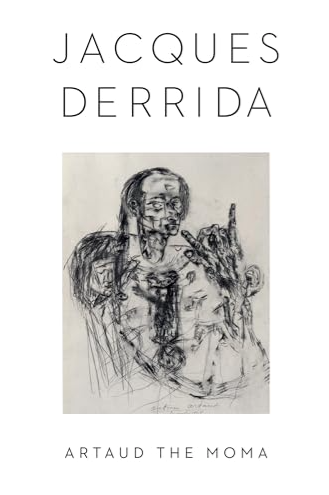 |
| ハムレッ
ト(梗概)→より詳しくは「ハムレット」を参照 (1)王が急死する。王の弟クローディアスは王妃と結婚し、後継者としてデンマーク王の座に就く。 (2)「父王の死」と「母の早い再婚」とで憂いに沈む王子ハムレットは、従臣から「亡き王の亡霊が夜な夜なエルシノアの城壁に現れる」という話を聞き、自 らも確かめる。父の亡霊に会ったハムレットは、実は父の死は「クローディアスによる毒殺」だったと告げられる。 (3)復讐を誓ったハムレットは狂気を装う。王と王妃はその変貌ぶりに憂慮するが、宰相ポローニアスは、その原因を「娘オフィーリアへの実らぬ恋」ゆえだ と察する。父の命令で探りを入れるオフィーリアを、ハムレットは無下に扱う。 (4)やがて、「王が父を暗殺した」という確かな証拠を掴んだハムレットだが、母である王妃と会話しているところを隠れて盗み聞きしていた宰相ポローニア スを、王と誤って刺殺してしまう[10]。 (5)さらに、宰相ポローニアスの娘オフィーリアは度重なる悲しみのあまり狂い、やがて溺死する。宰相ポローニアスの息子レアティーズは、父と妹の仇をと ろうと怒りを募らす。 (6)ハムレットの存在に危険を感じた王クローディアスは、復讐心を持ったレアティーズと結託し、毒剣と毒入りの酒を用意して、ハムレットを剣術試合に招 き、秘かに殺そうとする。しかし試合のさなか、王妃が毒入りとは知らずに酒を飲んで死に、ハムレットとレアティーズ両者とも試合中に毒剣で傷を負ってしま う。 (7)死にゆくレアティーズから真相を聞かされたハムレットは、王を殺して復讐を果たした後、事の顛末を語り伝えてくれるよう親友ホレイショーに言い残 し、この世を去ってゆく。 https://x.gd/U7T2Q |
この文書は、マルクスの幽霊とその影響、革命、そして現代の政治的状況
について論じている。 ■幽霊とマルクス ・生ける死者としてのマルクス マルクスの幽霊は、共産主義の象徴であり、歴史的な影響を持つ。 マルクスは、幽霊を通じて社会の変革を促進しようとした。 幽霊は、過去の暴力や抑圧の記憶を象徴する。 ■現代の政治的状況 現在の世界は、資本主義と新自由主義の影響を受けている。 マルクス主義の終焉が宣言されているが、実際にはその影響が残っている。 社会的不平等や貧困が依然として存在し、数値的に増加している。 ■革命の必要性 革命は、過去の教訓を生かし、未来に向けた新たな希望を生む。 マルクスの思想は、現代の社会問題に対する批判的な視点を提供する。 新しい国際的な連帯が求められている。 ■歴史的な文脈 1848年の革命は、マルクスの思想の重要な転機であった。 歴史は、幽霊のように繰り返される現象であり、過去の影響を受け続ける。 マルクスは、歴史の中での人間の役割を強調した。 ■結論 マルクスの幽霊は、現代においても重要な意味を持ち続けている。 社会の変革には、過去の教訓を学び、未来に向けた新たなビジョンが必要である。 幽霊の存在は、私たちの歴史と未来を結びつける重要な要素である |
★デリダ『マルクスの亡霊』(フランス語 ウィキペディア解説)
| Spectres de Marx
est
un livre du philosophe français Jacques Derrida paru aux éditions
Galilée en 1993. Il fait suite à une conférence prononcée à
l'université de Californie à Riverside la même année, lors d'un
colloque consacré à la pensée de Karl Marx intitulé Whither marxism?
(Où va le marxisme ?). Jacques Derrida introduit dans ce livre la
notion de spectralité et suscite la controverse chez les intellectuels
marxistes par sa méthode de la déconstruction. La conférence était
dédiée à la mémoire du communiste Chris Hani, militant contre
l'apartheid, assassiné le 10 avril 1993. Plan Exorde Chapitre 1 : Injonctions de Marx Chapitre 2 : Conjurer - le marxisme Chapitre 3 : Usures (tableau d'un monde sans âge) Chapitre 4 : Au nom de la révolution, la double barricade (impure "impure impure histoire de fantômes") Chapitre 5 : Apparition de l'inapparent : l'"escamotage" phénoménologique Résumé La notion de spectralité présente dans le titre trouve son origine dans les premières lignes du Manifeste du parti communiste, où Karl Marx écrit : « Un spectre hante l'Europe - le spectre du communisme »1. Derrida commente ce passage en rapport avec la scène d'apparition du spectre dans Hamlet de Shakespeare. Le spectre qui est pensé comme un spectre à venir à l'époque où Marx écrit son texte est pensé par Derrida comme un spectre venu du passé. La notion de spectralité permet de penser cette identité, que Derrida appelle l'hantologie. La question est posée de l'héritage du marxisme et de « l'esprit de Marx » à l'époque de la chute du communisme (chapitre 1). Derrida critique la thèse de Francis Fukuyama inspirée d'Alexandre Kojève concernant la fin de l'histoire 2 et la preuve historique d'une suprématie de la démocratie libérale (chapitre 2). Il fait état, au contraire, de « dix plaies » du « nouvel ordre mondial » en vue d'une « nouvelle Internationale » (chapitre 3). Il entre enfin dans une analyse littérale des textes où apparaît dans la philosophie de Marx lui-même la notion de spectralité : le Manifeste, mais aussi Le dix-huit Brumaire de Louis Napoléon Bonaparte, L'Idéologie allemande et Le Capital (chapitres 4 et 5). Auteurs cités William Shakespeare, Karl Marx, Paul Valéry, Maurice Blanchot, Martin Heidegger, Francis Fukuyama, Sigmund Freud, Hegel, Victor Hugo, Alexandre Kojève, Michel Henry, Emmanuel Lévinas, Max Stirner, Allan Bloom, Étienne Balibar. Critiques Le livre a donné lieu à des questions et objections de lecteurs en majorité marxistes comme Pierre Macherey, Terry Eagleton, Fredric Jameson, Werner Hamacher, Aijaz Ahmad (en) ou Toni Negri rassemblées dans un ouvrage en anglais paru en 1999 (Ghostly Demarcations). Jacques Derrida a répondu dans l'ouvrage Marx & Sons en 2002. |
"Spectres de
Marx"(『マルクスの亡霊』)はフランスの哲学者ジャック・デリダの著書で、1993年にガリレ社から出版された。同年、カリフォルニア大学リバーサ
イド校で開催された「マ
ルクス主義はどこへ向かうのか」と題するカール・マルクスの思想に関する会議での講演に続くものである。この本の中でジャック・デリダは、スペクトルとい
う概念を紹介し、脱構築という手法でマルクス主義知識人たちの論争を引き起こした。この会議は、1993年4月10日に殺害された共産主義者の反アパルト
ヘイト活動家クリス・ハニに捧げられた。 計画 序文 第1章 マルクスの禁止令=厳命(Injonctions de Marx) 第2章 呪術-マルクス主義(Conjurer - le marxisme) 第3章:用途(年齢不詳の世界像):Usures (tableau d'un monde sans âge) 第4章 革命の名において、二重のバリケード(不純な「不純な不純な怪談話」):Au nom de la révolution, la double barricade (impure "impure impure histoire de fantômes") 第5章 見えないものの出現--現象学的「エスカモタージュ」:Apparition de l'inapparent : l'"escamotage" phénoménologique まとめ タイトルにある「幽霊」の概念は、『共産党宣言』の冒頭でカール・マルクスが「ヨーロッパには幽霊がとりついている-共産主義の幽霊である」と書いている ことに由来する1。 デリダはこの一節について、シェイクスピアの『ハムレット』で亡霊が登場する場面との関連でコメントしている。マルクスが彼のテクストを書いた時点で、来 るべき亡霊として考えられている亡霊は、デリダによっ ては過去からの亡霊として考えられているのである。妖怪性の概念は、デリダがハントロジーと呼ぶこの同一性について考えることを 可能にする。マルクス主義の遺産と共産主義崩壊時の「マルクスの精神」についての問題が提起される(第1章)。 デリダは、アレクサンドル・コジェーヴに触発されたフランシス・フクヤマの「歴史の終わり2」についてのテーゼと、自由民主主義の優位性の歴史的証明を批 判する(第2章)。 それどころか、「新しい国際」を視野に入れた「新しい世界秩序」の「10の傷」について述べている(第3章)。 最後に、マルクス自身の哲学の中で「スペクトル」の概念が登場するテクスト、すなわち『宣言』、『ルイ・ナポレオン・ボナパルトの18回目の叱責』、『ド イツ・イデオロギー』、『資本論』の文字通りの分析に入る(第4章と第5章)。 引用された作家 ウィリアム・シェイクスピア、カール・マルクス、ポール・ヴァレリー、モーリス・ブランショ、マルティン・ハイデガー、フランシス・フクヤマ、ジークムン ト・フロイト、ヘーゲル、ヴィクトル・ユーゴー、アレクサンドル・コジェーヴ、ミシェル・アンリ、エマニュエル・レヴィナス、マックス・シュティルナー、 アラン・ブルーム、エティエンヌ・バリバール。 書評 本書は、ピエール・マチェリー、テリー・イーグルトン、フレドリック・ジェイムソン、ヴェルナー・ハマッハー、アイジャズ・アフマド、トニ・ネグリといっ た主にマルクス主義の読者から疑問や反論を生み、それらは1999年に英語で出版された本(Ghostly Demarcations)にまとめられた。ジャック・デリダは2002年に『マルクスと息子たち』でこれに反論している。 |
| https://fr.wikipedia.org/wiki/Spectres_de_Marx |
マルクスの亡霊たち : 負債状況=国家、喪の作業、新しいインターナショナル / ジャック・デリダ [著] ; 増田一夫訳・解説,藤原書店 , 2007/ Spectres de Marx : l'État de la dette, le travail du deuil et la nouvelle Internationale / Jacques Derrida , Paris : Galilée , c1993. - (Collection La philosophie en effet) |
| Chris Hani
(28 June 1942 – 10 April 1993),[1] born Martin Thembisile Hani SSA,
SBS, CLS, DMG, MMS, was the leader of the South African Communist Party
and chief of staff of uMkhonto we Sizwe, the armed wing of the African
National Congress (ANC). He was a fierce opponent of the apartheid
government, and was assassinated by Janusz Waluś, a Polish immigrant
and sympathiser of the Conservative opposition on 10 April 1993, during
the unrest preceding the transition to democracy.[2] |
ク
リス・ハニ(1942年6月28日 - 1993年4月10日)は、[1]出生名はマーティン・テムビシレ・ハニ(Martin Thembisile
Hani)で、SSA、SBS、CLS、DMG、MMSの称号を持つ。南アフリカ共産党の党首であり、アフリカ民族会議(ANC)の軍事部門である
uMkhonto we Sizweの参謀長であった。彼はアパルトヘイト政権の強硬な反対
者であり、1993年4月10日、民主化への移行を前にした混乱のさなか、保守野党のシンパであるポーランドからの移民ヤヌス・ヴァルース(Janusz
Waluś)によって暗殺された。[2] |
| Early life Martin Thembisile Hani was born on 28 June 1942[1] in the Xhosa village in Cofimvaba, Transkei. His father Gilbert Hani was a mine union worker and political activist who left the country to go into exile in 1962 and returned to South Africa in 1991. His mother Mary Hani was a simple person who had never attended school. He was the fifth of six children. He attended Lovedale school in 1957, to finish his last two years. He twice finished two school grades in a single year. When Hani was 12 years old, after hearing his father's explanations about apartheid and the African National Congress (ANC), he wished to join the ANC but was still too young to be accepted.[3] In Lovedale school, Hani joined the ANC Youth League when he was 15 years old, even though political activities were not allowed at black schools under apartheid. He influenced other students to join the ANC.[3] In 1959, at the University of Fort Hare in Alice, Eastern Cape, Hani studied English, Latin[3] and modern and classical literature.[4] He did not participate in any sport, saying: "I would rather fight apartheid than play sport."[3] Hani, in an interview on the Wankie campaign, mentioned that he was a Rhodes University graduate.[5] |
幼少期 マーティン・テンビシレ・ハニは1942年6月28日[1]、トランスカイのCofimvabaにあるコサ族の村で生まれた。父親のギルバート・ハニは鉱 山労働組合の労働者であり、政治活動家でもあった。1962年に国外へ亡命し、1991年に南アフリカへ戻った。母親のメアリー・ハニは学校へ行ったこと がない質素な人格であった。彼は6人兄弟の5番目だった。1957年、彼は最後の2年間を過ごすためにラブデール学校に入学した。彼は1年で2学年分の学 習を修了したことが2度あった。ハニが12歳の時、父親からアパルトヘイトとアフリカ民族会議(ANC)について説明を聞いた後、ANCに参加したいと希 望したが、まだ若すぎたため参加は認められなかった。[3] アパルトヘイト体制下では黒人学校での政治活動は禁止されていたが、ハニは15歳でラブデール学校のANC青年同盟に参加した。彼は他の学生たちにも ANCに参加するよう影響を与えた。[3] 1959年、東ケープ州アリスフォートヘア大学でハニは英語とラテン語[3]、そして近代および古典文学を学んだ[4]。彼はスポーツには一切参加せず、 「スポーツをするくらいならアパルトヘイトと戦う」と語った[3]。ハニは、ワンキー選挙区でのインタビューで、ローズ大学を卒業したと述べた[5]。 |
| Political and military career At the age of 15, he joined the ANC Youth League. As a student, he was active in protests against the Bantu Education Act. He worked as a clerk for a law firm. Following his graduation, he joined Umkhonto we Sizwe (MK), the armed wing of the ANC. Following his arrest under the Suppression of Communism Act, he went into exile in Lesotho in 1963.[4] Because of Hani's involvement with Umkhonto we Sizwe, he was forced into hiding by the South African government and changed his first name to Chris.[4] He received military training in the Soviet Union and served in campaigns in the Zimbabwean War of Liberation, also called the Rhodesian Bush War. They were joint operations between Umkhonto we Sizwe (MK) and the Zimbabwe People's Revolutionary Army in the late 1960s. The Luthuli Detachment operation consolidated Hani's reputation as a soldier in the black army that took the field against apartheid and its allies. His role as a fighter from the earliest days of MK's exile (following the arrest of Nelson Mandela and the other internal MK leaders at Rivonia) was an important part in the fierce loyalty that Hani later enjoyed in some quarters as MK's Deputy Commander (Joe Modise was overall commander). In 1969, Hani co-signed, with six others, the "Hani Memorandum", which was strongly critical of the leadership of Joe Modise, Moses Kotane and other comrades in the leadership.[6] In Lesotho, Hani organised guerrilla operations of the MK in South Africa. By 1982, he had become prominent enough to have become the target of assassination attempts, and he eventually moved to the ANC's headquarters in Lusaka, Zambia. As head of Umkhonto we Sizwe, he was responsible for the suppression of a mutiny by dissident anti-Communist ANC members in detention camps, but denied any role in abuses including torture and murder.[4] Many MK female operatives, such as Dipuo Mvelase, adored Chris Hani for having protected women's rights and caring about their wellbeing at military camps.[7] Having spent time as a clandestine organiser in South Africa in the mid-1970s, he permanently returned to South Africa following the unbanning of the ANC in 1990, and took over from Joe Slovo as head of the South African Communist Party (SACP) on 8 December 1991.[8] He supported the suspension of the ANC's armed struggle in favour of negotiations.[9] |
政治および軍歴 15歳でANC青年同盟に参加。学生時代にはバンツー教育法に反対する抗議活動に参加。法律事務所で事務員として勤務。卒業後、ANCの軍事部門である 「ウニオン・コントラ・ウェ・シズウェ(MK)」に参加。共産主義抑制法違反容疑で逮捕された後、1963年にレソトに亡命した。[4] ハニがMKに関与していたため、南アフリカ政府によって身を隠すことを余儀なくされ、クリスという名前に改名した。[4] ソビエト連邦で軍事訓練を受け、ジンバブエ解放戦争(ローデシア内戦とも呼ばれる)に従軍した。これは1960年代後半に、ムコントゥ・ウェ・シズウェ (MK)とジンバブエ人民革命軍が共同で行った作戦である。ルツリ分遣隊作戦は、アパルトヘイトとその同盟国と戦った黒人軍の兵士としてのハニの名声を確 固たるものにした。MKの亡命初期(リヴォニアにおけるネルソン・マンデラおよびその他のMK内部指導者の逮捕後)から戦闘員として活躍したハニの役割 は、後にMKの副司令官(ジョー・モジセが総司令官)として一部で称賛された忠誠心の強さの重要な一部であった。1969年、ハニは他の6名とともに「ハ ニ覚書」に署名した。この覚書は、ジョー・モディセやモーゼス・コタネをはじめとする指導部に対する強い批判を展開したものである。 レソトでは、ハニは南アフリカにおける MK のゲリラ活動を指揮した。1982年までに、彼は暗殺の標的となるほどに著名な人物となり、最終的にはザンビアのルサカにあるANCの本部に移った。彼 は、反体制派の反共産主義ANCメンバーによる拘留キャンプでの反乱の鎮圧を指揮したが、拷問や殺人を含む虐待行為への関与は否定した。[4] ディプオ・ムベラセ(Dipuo Mvelase)など、多くのMK女性工作員は、軍事キャンプで女性の権利を守り、彼女たちの幸福を気遣ったクリス・ハニを慕っていた。[7] 1970年代半ばに南アフリカで秘密裏に組織化に携わった後、1990年のANCの非合法化解除を受けて南アフリカに永住し、1991年12月8日、 ジョー・スロボの後任として南アフリカ共産党(SACP)の党首に就任した。[8] 彼はANCの武装闘争の停止を支持し、交渉を優先させた。[9] |
| Assassination Main article: Assassination of Chris Hani Chris Hani was assassinated on 10 April 1993 outside his home in Dawn Park, a racially mixed suburb of Boksburg. He was accosted by a Polish far-right anti-communist immigrant named Janusz Waluś, who shot him as he stepped out of his car.[10] Waluś fled the scene but was soon arrested after Margareta Harmse, a white Afrikaner housewife, saw Waluś straight after the crime as she was driving past, and called the police. A neighbour of Hani also witnessed the crime and later identified both Waluś, and the vehicle he was driving at the time. Clive Derby-Lewis, a senior South African Conservative Party MP and Shadow Minister for Economic Affairs at the time, who had lent Waluś his pistol, was also arrested for complicity in Hani's murder.[11] The Conservative Party of South Africa had broken away from the ruling National Party out of opposition to the reforms of P. W. Botha. After the elections of 1989, it was the second-strongest party in the House of Assembly, after the National Party, and opposed F. W. de Klerk's dismantling of apartheid. Historically, the assassination is seen as a turning point. Serious tensions followed the assassination, with fears that the country would erupt in violence. Nelson Mandela addressed the nation appealing for calm, in a speech regarded as presidential even though he was not yet president of the country:[12] Tonight I am reaching out to every single South African, black and white, from the very depths of my being. A white man, full of prejudice and hate, came to our country and committed a deed so foul that our whole nation now teeters on the brink of disaster. A white woman, of Afrikaner origin, risked her life so that we may know, and bring to justice, this assassin. The cold-blooded murder of Chris Hani has sent shock waves throughout the country and the world. ... Now is the time for all South Africans to stand together against those who, from any quarter, wish to destroy what Chris Hani gave his life for – the freedom of all of us. While riots followed the assassination,[11] both sides of the negotiation process were galvanised into action, and they soon agreed that the democratic elections should take place on 27 April 1994, just over a year after Hani's assassination.[12] |
暗殺 詳細は「クリス・ハニ暗殺事件」を参照 クリス・ハニは1993年4月10日、人種的に多様なボクサングの郊外にあるドーンパークの自宅の外で暗殺された。彼は、ヤヌシュ・ヴァルスという名の ポーランド系極右反共主義の移民に声をかけられ、車から降りたところを銃撃された。ヴァルスは現場から逃走したが、アフリカーナー系白人の主婦であるマル ガレータ・ハームセが、事件直後に通りかかった際にヴァルスを目撃し、警察に通報したため、まもなく逮捕された。ハニの隣人も犯罪を目撃しており、後にワ ルースと、その時に彼が運転していた車を特定した。当時、保守党の国会議員で経済担当の野党大臣であったクライヴ・ダービー=ルイスはワルスに拳銃を貸し ており、ハニ殺害の共犯容疑で逮捕された。[11] 南アフリカ保守党は、P. W. ボタの改革に反対して与党であった国民党から離党した。1989年の選挙後、保守党は国民党に次ぐ第2党となり、F. W. デクラークのアパルトヘイト撤廃政策に反対した。 歴史的に見ると、暗殺は転換点と見なされている。暗殺後、深刻な緊張状態が続き、国内で暴力が勃発するのではないかという懸念が広がった。ネルソン・マン デラは、まだ大統領に就任していないにもかかわらず、大統領のような演説で国民に冷静さを呼びかけた。 今宵、私は心の底から、南アフリカの黒人も白人も含めたすべての人々に呼びかけたい。偏見と憎悪に満ちた白人がわが国を訪れ、あまりにも卑劣な行為を働い たために、今、わが国全体が危機に瀕している。アフリカーナー系白人の女性が、命を懸けて、我々にこの暗殺者の存在を知らせ、正義の裁きを受けさせるため に尽力した。クリス・ハニの冷酷な殺害は、国内および世界中に衝撃を与えた。今こそ、南アフリカのすべての人々が団結し、クリス・ハニが命を懸けて守ろう としたもの、すなわち我々すべての人々の自由を破壊しようとする者たちに立ち向かう時である。 暗殺後に暴動が起こったが[11]、交渉の両当事者は行動を起こし、ハニが暗殺されてから1年余り後の1994年4月27日に民主的な選挙を実施すること で合意した。[12] |
| Assassins' conviction and
amnesty hearing In October 1993, both Janusz Waluś and Clive Derby-Lewis were convicted for the murder[13] and sentenced to death. Derby-Lewis's wife, Gaye, was acquitted. Both men's sentences were commuted to life imprisonment when the death penalty was abolished as a result of a Constitutional Court ruling in 1995.[14] Hani's killers appeared before the Truth and Reconciliation Commission, claiming political motivation for their crimes and applying for amnesty on the basis that they had acted on the orders of the Conservative Party. The Hani family was represented by the anti-apartheid lawyer George Bizos.[15] Their applications were denied when the TRC ruled that they had not acted under orders.[16] Following several failed attempts, Derby-Lewis was granted medical parole in May 2015 after he had been diagnosed with terminal lung cancer; he died 18 months later, on 3 November 2016.[17] On 10 March 2016, the North Gauteng High Court ordered Waluś to be released on parole under bail conditions.[18] The Department of Justice and Correctional Services lodged an appeal against the parole decision to the Supreme Court of Appeal in Bloemfontein.[19] The Department of Home Affairs has indicated that Waluś may have his South African citizenship revoked.[19] On 18 August 2017, the Supreme Court of Appeal in Bloemfontein overturned Waluś's parole, a decision that was welcomed by the SACP.[20] By October 2019, Waluś was still in prison, despite his lawyer's claim that he is completely rehabilitated.[21] On 16 March 2020, Waluś was again denied parole by Justice Minister Ronald Lamola.[22] On 7 December 2022, Waluś was granted parole under strict conditions by Justice Minister Ronald Lamola.[23] In 2024, the government announced that Waluś was to be deported to Poland on 6 December with the Polish government paying for the proceedings.[24] Absence of conspiracy Hani's assassination has attracted numerous conspiracy theories about outside involvement. The final report of the Truth and Reconciliation Commission said it "was unable to find evidence that the two murderers convicted of the killing of Chris Hani took orders from international groups, security forces or from higher up in the right-wing echelons".[25] |
暗殺者たちの有罪判決と恩赦聴聞会 1993年10月、ヤヌシュ・ヴァルゥシとクライヴ・ダービー=ルイスの両名は殺人罪で有罪判決を受け[13]、死刑を言い渡された。ダービー=ルイスの 妻ゲイは無罪となった。1995年の憲法裁判所の判決により死刑が廃止されたため、両名に対する刑は終身刑に減刑された。 ハニの殺人犯は真実和解委員会に出席し、犯罪には政治的な動機があったと主張し、保守党の命令に従ったとして恩赦を申請した。ハニ一家は反アパルトヘイト 弁護士ジョージ・ビゾスによって代理された。[15] 彼らの申請は、TRCが彼らの行為は命令によるものではないと裁定したため却下された。[16] 何度かの失敗を経て、ダービー=ルイスは末期の肺癌と診断された後、2015年5月に医療仮釈放が認められた。彼は18か月後の2016年11月3日に死 去した。[17] 2016年3月10日、北ハウテン高等裁判所はワルースに保釈条件付きの仮釈放を命じた。[18] 司法・矯正局は、仮釈放決定に対してブルームフォンテーンにある最高裁判所に控訴した。[19] 内務省は、ワルースの南アフリカ国籍が剥奪される可能性を示唆した。[19] 2017年8月18日、ブルームフォンテーンにある最高 ブルームフォンテーンの最高裁判所はワルスの仮釈放を覆す決定を下し、この決定は南アフリカ共産党(SACP)に歓迎された。[20] 2019年10月までに、ワルスの弁護士は彼が完全に更生したと主張したが、ワルスは依然として刑務所に収監されていた。[21] 2020年3月16日、ワルスはロナルド・ラモラ法務大臣によって再び仮釈放を拒否された。[22] 2022年12月7日、 ウォレスは厳格な条件付きで仮釈放を認められた。2024年、政府はウォレスを12月6日にポーランド政府が手続き費用を負担してポーランドに送還すると 発表した。 陰謀説の不在 ハニの暗殺は、外部の関与に関する数多くの陰謀説を引き起こした。真実和解委員会の最終報告書は、「クリス・ハニ殺害の罪で有罪判決を受けた2人の殺人犯 が、国際組織、治安部隊、または右翼のエリート層の上層部から命令を受けていたという証拠は見つからなかった」と述べた。[25] |
| Influence Hani was a charismatic leader, with significant support among the radical anti-apartheid youth. At the time of his death, he was the most popular ANC leader after his senior, Nelson Mandela.[16] Following the legalisation of the ANC, His support for the negotiation process with the apartheid government was critical in keeping the militants in line.[26] |
影響力 ハニはカリスマ的指導者であり、急進的な反アパルトヘイトの若者たちから多大な支持を得ていた。 彼の死の時点では、先輩のネルソン・マンデラに次いでANCで最も人気のある指導者であった。[16]ANCの合法化後、アパルトヘイト政府との交渉プロ セスに対する彼の支持は、武装勢力を統制する上で極めて重要であった。[26] |
| https://en.wikipedia.org/wiki/Chris_Hani |
****
デリダはマルクスの唯物論(=実在的存在論)に対して批判する。唯物論は、過去あ るいは現在の実在(リアリティ)は、観念(=デリダはそれを非 実在の幽霊 [spectres]としてとらえる)抜きになしに理解可能であるという立場をとる。だがそれは、傲慢な考え方ではないか?そのように考える(=脱構築す ると)とマルクスの著作には、霊(spirits)から逃亡しようとして、思索を深めた形跡がある。だが、霊から逃れてはならない(→我々は霊にハック= 取り憑かれる存在だからだ)——抽象的な理念と理念を完全に「肉化」する試みの現実態の中間にあるので、それは存在論ではなく、憑在論と呼ばれるものに相 当する。
マルクスの人間解放論は、正義のもとでな
されると、その意味で[その社会理論は]、一種の構造的メシアニズム(宗教なきメシアニズム)になる。
****
亡霊の姿は、しばしば現れる度に異なった 様相をもち(同一性を持たない)「延 期されたオリジナルではないもの」としての登場する。反復して登場する、死者の亡霊はつねに「始まり」の姿を露(あらわ)にする。過去の亡 霊の登場は、時間的秩序をゆるがし、解決済みのものではないことを、生者に不安な混乱を通して呼びかけるものである。
そのような、亡霊と生者との間には、理想 的なコミュニケーションな どは不可能であるし、それらの「対話」が、容易なるものがあるだろう。僕たちは、 亡霊を前にして、冷静に相手に対して「対話」などをすることが困難なことは想像に難くない。
デリダは端的に、亡霊の現存在=そこにい る、とはどういうことだと問いをたてる。
現に、亡霊に不安を感じている人はいる。 また、生身を持たず、現前する実在性も、アクチュアリティも現実性ももたぬ亡霊ゆえに、それは過去の遺 物にすぎないとおもっている人も多い(→「アイヌ遺骨の返還問 題について」)。
「鎮まれ、鎮まれ、せっかちな亡霊よ」 (ハムレット)——Horatio says ’tis but our fantasy And will not let belief take hold of him- MARCELLUS
結局のところ「亡霊とは未来なのである、つねに来たるべきものであり、再 -来するかもしれぬもの」(「そのようなものとしてからみずからを現前 させることはない」)(デリダ 2007b:4)
| ■「私が、幽霊と相続と世代=生殖につい
て、幽霊のいくつもの世代=誕生、すなわちわれわれの前
にも、われわれの内にも、われわれの外部にも現前しておらず、現在生きていないある他者たち
について、これから長々と話そうとしているのは、正義の名においてである。まだ存在
しない正義、まだここにはない正義、もはやここにはない正義、すなわちもはや現前せず、法
にも還元できないところにある正義の名においてである。そ
の他者たちがすでに死んでしまったにせよまだ生まれていないにせよ、もはやここに現前して生
きていないあの他者たち、あるいはまだここに現前して生きていないあの他者たち、その他者た
ちの尊重を原理として持たぬいかなる倫理あるいは政治学——その政治学が革命的であろうとな
かろうと——これらのいずれもが可能とも思考可能とも正しいとも思われない限りにおいて幽
霊について話さねばならず、ひいては幽霊に対して話さねばならず、さらには幽霊とともに話さ
ねばならない」(デリダ 2007a:13) ●「一切の生き生き とした現在の彼方における責任=応答可能性、生き生きとした現在の節合をはずすものにおける/ 責任=応答可能性、まだ生まれていない者もしくはすでに死んでしまった者たちの幽霊の前での 責任=応答可能性なしには。その彼らが、戦争ゃ、政治的その他の暴力や、民族主義的、植民地 主義的、性差別的その他の絶滅や、資本主義的帝国主義あるいはあらゆる形態の全体主義による 圧制、それらの犠牲者であろうとなかろうと。生き生きとした現在の、自己に対するこの非-同 時性がなければ、その現在の正確さをひそかに狂わせるものがなければ、ここにはいない者たち ーーすなわち〈もはや〉あるいは〈まだ〉現前してはおらず生きていない者たち——への正義の ための責任と敬意がなければ、「どこに?」、「明日はどこに?(whiter?)」という問いを立て るどんな意味があるというのだろうか」(デリダ 2007a:13-14)。 |
★憑在論批判
「デリダは、他者を完全に脱存在化するこ
とにより、他者性をきたるべきものに還元し、その結果、約束という幽霊だけが残る」ジジェク『操り人形と小人』(210)」
■デリダの『マルクスの亡霊たち』(増田 一夫訳)について
導入
1.マルクスの厳命
2.共謀する=厄祓いする——マルクス主義(を)
3.摩耗(年齢、時代なき世界の描写)
4.革命の名のもとに、二重のバリケード(不純な「不純なる不純な幽霊たちの物語」)
5.現れざるものの出現——現象学的「手品」
■共産主義の亡霊
亡霊の比喩は、マルクス・エンゲルスが「共産主義者宣言(共産党宣言)1848年」で、共産主義のこと(das Gespenst des Kumunismus)を比喩して表現した。だが、マルクスの著作のうちフランス三部作「フランスにおける階級闘争」「ルイ・ボナパルトのブリュメール 18日」「フランスの内乱」に登場する。
共産主義者宣言/共産党宣言の憑在論︎▶︎マルクス主義と
いう名のオブセッション▶イウォーク▶カール・マルクスの思想︎▶ハム
レット︎︎▶︎▶︎︎▶︎▶︎︎▶︎▶︎
リンク(マルクス関係)
リンク(概念用語)
文献
Mitzub'ixi Quq Chi'j
Copyleft, CC, Mitzub'ixi Quq Chi'j, 1997-2099
Do not paste, but
[Re]Think our message for all undergraduate
students!!!